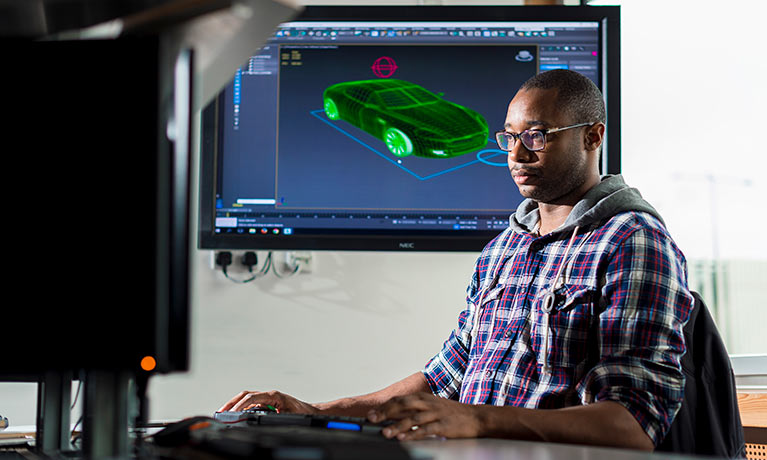Search
Computer Science with Artificial Intelligence MSci/BSc (Hons)
Study level: UndergraduateDegree with foundation year

With recent advancements in AI technology (e.g. ChatGPT), this course covers the practical skills and theoretical knowledge you need if you hope to be successful in this fast-paced, ever-changing industry.
Course features
Course option
Year of entry
Location
Coventry University (Coventry)
Study mode
Full-time
Sandwich
Duration
BSc:3 years full-time4 years sandwich
MSci:4 years full-time5 years sandwich
Condensed first year available
UCAS codes
G401 / G402
Start date
January 2026 - condensed
Course overview
The Computer Science with Artificial Intelligence (AI) course aims to equip you with all the knowledge and skills you need to become an AI specialist in the computing industry.
You will:
- explore artificial intelligence and its relationship to machine learning, parallel programming, and data science, and learn how these areas drive innovation and change in the domain of computer science
- master the practical skills and theoretical knowledge to develop software solutions that address demanding user expectations and complex customer requirements
- gain industry-relevant experience2 as you apply real-world, software development practices within teams of your peers, preparing you for your AI specialist career after graduation.
The January start for this course is condensed in Year 1. Please see the ‘How you’ll learn’ section below for more details.
Rated Gold Overall
Teaching Excellence Framework (TEF) 20235 QS Stars for Teaching and Facilities
QS Stars University RatingsTop 5 Student City in England (Coventry)
QS Best Student Cities Index 2026Why you should study this course
- Activity-led learning helps you consolidate what you are taught through practical application of everything covered in lectures.
- Opportunity to spend a year on industrial placement2.
- Strong, professional skills focus.
- Hybrid, online and asynchronous learning, to support students with different needs across a range of locations.
- Free-to-attend guest lecturers from current practitioners2 which, in previous years, have included senior professors from Sheffield, Lincoln and Birmingham universities and the European Bioinformatics Centre Cambridge (subject to availability).
If you choose to start this course in January you will study exactly the same course but over a slightly shorter timescale in Year 1. This is ideal if you missed the September start, want to transfer from a different university or course or just need a bit more time to prepare for life at university.
What you'll study
We regularly review our course content, to make it relevant and current for the benefit of our students. For these reasons, course modules may be updated.
How you'll learn
Our teaching is active, applied, social and inclusive. We work interactively to address your needs as an individual and support you to maximise your outcomes.
If you choose to start this course in January it will be run as a condensed programme. You’ll start your course in January and finish your first year in August. Upon successful completion of Year 1, you will progress onto Year 2 in September and then continue to start subsequent years of your course in September, completing your degree at the same time as the September starters unless you opt to do a placement year.
Teaching contact hours
As a full-time undergraduate student, you will study modules totalling 120 credits each academic year. A typical 20 credit module requires a total of 200 hours study. This is made up of teaching contact hours, guided and independent study.
Teaching hours:
Teaching hours vary each semester, year of study and due to module selection. During your first year you can expect 15-18 teaching hours each week. You will also have the option to attend optional sessions including time with a progress coach or to meet with staff for advice and feedback. As you progress through your studies, teaching hours may reduce.
Guided and independent study:
Throughout your studies, you will be expected to spend time in guided and independent study to make up the required study hours per module. You’ll be digging deeper into topics, review what you’ve learned and complete assignments. This can be completed around your personal commitments. As you progress through your studies, you’ll spend more time in independent study.
Online learning:
As an innovative university, we use different teaching methods including online tools and emerging technologies. So, some of your teaching hours and assessments may be delivered online.
Assessment
This course will be assessed using a variety of methods which will vary depending upon the module.
Assessment methods may include:
- individual coursework
- group coursework
- exams
- tests
- essays
- presentations
- reports
- projects
- vivas
- core assessments (these are pass/fail and can be attempted multiple times).
The Coventry University Group assessment strategy ensures that our courses are fairly assessed and allows us to monitor student progression towards achieving the intended learning outcomes.
International experience opportunities
The degree aims to offer access to a range of international experiences2 including:
- COIL projects – online internationalised learning, working with university students based in other countries (subject to availability).
- Field trips – short trips of one or two weeks to visit other countries for cultural and learning experiences.
- Study abroad optional extra year – live and study abroad for a year between your second and final years.
Please note that all international experience opportunities may be subject to additional costs, competitive application, availability, and meeting applicable visa and travel requirements, and are therefore not guaranteed2.
Entry requirements
Typical entry requirements:
Not got the required grades? We offer this degree with an integrated foundation year.
Fees and funding
| Student | Full-time | Part-time |
|---|---|---|
| UK, Ireland*, Channel Islands or Isle of Man | £9,535 per year | Not available |
| EU | £9,535 per year with EU Support Bursary** £19,850 per year without EU Support Bursary** |
Not available |
| International | £19,850 per year | Not available |
If you choose to study this course with a professional placement2 or study abroad year, you will need to pay a tuition fee3 to cover your academic support throughout your placement year. Students commencing their professional placement in the academic year 2027/28 will pay £1,500 if they are paying UK fees, or £1,800 if they are paying international fees.
For advice and guidance on tuition fees and student loans visit our Undergraduate Finance page and see The University’s Tuition Fee and Refund Terms and Conditions.
The University will charge the tuition fees that are stated in the above table for the first Academic Year of study. The University will review tuition fees each year. For UK (home) students, if Parliament permits an increase in tuition fees, the university may increase fees for each subsequent year of study in line with any such changes. Note that any increase is expected to be in line with inflation.
If you choose to study this course with a professional placement, the University will charge the tuition fees stated above for those on a placement during Academic Year 2027/28. The University will review professional placement tuition fees each year. For UK (home) students, the University may increase fees for each subsequent year of study, but such that it will be no more than 5% above inflation.
For international students, we may increase fees each year, but such increases will be no more than 5% above inflation. If you defer your course start date or have to extend your studies beyond the normal duration of the course (e.g. to repeat a year or resit examinations) the University reserves the right to charge you fees at a higher rate and/or in accordance with any legislative changes during the additional period of study.
We offer a range of International scholarships to students all over the world. For more information, visit our International Scholarships page.
Tuition fees cover the cost of your teaching, assessments, facilities and support services. There may be additional costs not covered by this fee such as accommodation and living costs, recommended reading books, stationery, printing and re-assessments should you need them. Find out what's included in your tuition costs.
The following are additional costs not included in the tuition fees:
- Any optional overseas field trips or visits: £400+ per trip.
- Any costs associated with securing, attending or completing a placement (whether in the UK or abroad).
Condensed course – January start date
If you choose to start this course in January please make sure you check the Fees and Finance page for more information. Although starting this course in January does not prohibit you from being eligible for student finance, the way it is paid in your first year differs from those who start their course in September.
If you start the course in January, your tuition fees will be paid in accordance with the university’s Tuition Fees, Refund and Withdrawal Terms and Conditions for January starters and for any further years of study, your fees will be paid in accordance with the terms for September starters.
*Irish student fees
The rights of Irish residents to study in the UK are preserved under the Common Travel Area arrangement. If you are an Irish student and meet the residency criteria, you can study in England, pay the same level of tuition fees as English students and utilise the Tuition Fee Loan.
**EU Support Bursary
Following the UK's exit from the European Union, we are offering financial support to all eligible EU students who wish to study an undergraduate or a postgraduate degree with us full-time. This bursary will be used to offset the cost of your tuition fees to bring them in line with that of UK students. Students studying a degree with a foundation year with us are not eligible for the bursary.
Facilities
Your studies will be centred in high-specification learning environments that benefit from extensive social learning facilities, well-appointed laboratories, lecturing facilities and classrooms, facilitating our innovative teaching methods across a diverse suite of courses4.
Facilities are subject to availability. Access to some facilities (including some teaching and learning spaces) may vary from those advertised and/or may have reduced availability or restrictions where the university is following public authority guidance, decisions or orders.

Cisco lab
The Cisco lab is used for working with general networking and towards accreditation by Cisco. Optional modules allow students to work in the lab to develop skills in preparation for the Cisco certification exam.

Virtual labs
Our virtual labs provide a cutting-edge environment to create entire virtual networks, complete with services, users and even attackers. Students can access this environment from anywhere on or off campus.

Games Technology lab
This lab contains high-end gaming PCs with the capacity to run industry standard games engines and programming environments. It also supports Virtual Reality (VR) game development.
Careers and opportunities
The Computer Science with AI degree can equip you with the knowledge, technical skills, and professional skills for a career in the computing industry as an AI specialist.
Upon successful completion of the degree, you will be able to:
- program - you will create working solutions to a variety of computational and real-world problems using an appropriate programming language (or languages) for the task
- think computationally - you will be able to create, develop and evaluate algorithms, and measure and optimise algorithm complexity
- develop software - you will develop a product from the initial stage of requirements all the way through development to its final stages of testing and evaluation
- solve problems in a range of key application areas including web and app development, machine learning, data science and artificial intelligence
- work professionally - you will understand the professional practice of technical, social, ethical and legal responsibilities
- think critically, contribute confidently, communicate effectively and collaborate collegiately.
Computer science is changing the world and AI is a key part of this. Technologies produced by computer scientists now support and enhance all areas of our modern lives, from e-commerce, through social networking, to smart cars. These areas increasingly use AI to gather, interpret and learn from data to produce intelligent solutions. The Computer Science with AI degree teaches the required skills, and, equipped with them, you’ll be able to pursue an AI specialist career in the computing industry.
Further study
The Computer Science with AI degree includes an optional MSci year. Alternatively, the BSc (Hons) degree serves as a basis for a range of standalone master’s degrees, both at Coventry University, nationally and internationally. It might also be possible to take a PhD (all subject to meeting all progression requirements).

Discover Phoenix+
Phoenix+ brings you together with other students to learn, experience and develop essential knowledge and skills. Whatever destination you choose, it's about preparing you for life after university.
Learn more about Phoenix+How to apply
You may also like

Information Technology Management BSc (Hons)

Interactive Media and Web Technologies BSc (Hons)






